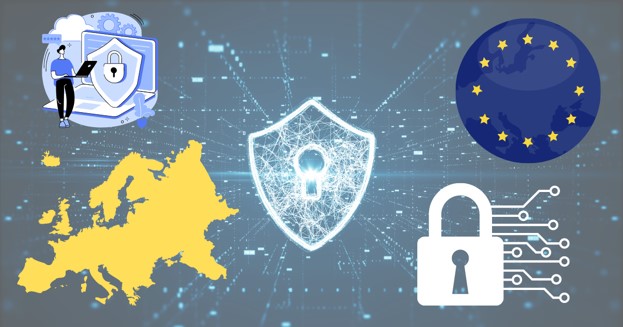European Websites Cybersecurity Case study: As the global population continues to become more intertwined with the digital realm, the essence of cybersecurity grows ever more critical. From individuals and organizations to governments, vulnerability to cyber threats is a common concern that transcends borders.
An ESET study reveals that some European countries tackle cybersecurity more prominently than other EU member nations. This shows how online safety has become prevalent in the continent.
European websites have particularly emphasized the implementation of cybersecurity measures to ensure the safety of their proprietary data and that of their consumers.
So, let’s discuss the cybersecurity strategies these websites employ and why such protective measures are of such grave importance for establishing a secure digital space.
Cybersecurity Efforts within the European Union: A United Stand
The European Union (EU) has taken practical and collective steps toward cybersecurity as cyber threats continue to threaten digital spaces and ensure fortified environments. In order to ensure the online safety of online businesses and individual using the internet, the EU has introduced various strategic policies and frameworks.
NIS Directive is at the core of all these efforts. The pioneering and first-of-its-kind legislation from the European Union has been enacted to toughen cybersecurity infrastructure in all the EU countries by providing a full framework for managing cybersecurity risks. This clearly highlights the dedication of the EU and its determination to combat online threats. This has encouraged website owners to implement security measures to ensure the online safety of themselves and their visitors.
Measures Taken by European Websites
Encryption and Secure Communication: The First Line of Defense
It goes without saying that encryption is one of the key aspects of online security, and European websites use various military-grade encryption tech to ensure the safety and security of digital communication and data of the users. SSL (Secure Sockets Layer) and TLS (Transport Layer Security) are safety protocols that are used by these websites to encrypt data transmitted online. From online gaming sites like WinkSlots, which handles users’ financial and personal data, to normal blogs, all EU websites abide by these protective measures. Such practices make it very difficult for cybercriminals or unauthorized persons to gain access to private and sensitive information available on the site.
Access Control and Authentication: To Gatekeep the Data
Along with encryption, European websites have implemented critical measures to protect consumer data. For instance, to ensure only authenticated persons have access to the data, they have to go through two-factor authentication along with confirming identity with credentials. Moreover, role-based access control (RBAC) systems are used to designate specific privileges to different user roles, thereby creating another layer of security to prevent unauthorized access to sensitive data.
Consistent Security Updates and Patch Management: To Keep Up with the Times
Cyber threats are not static; they evolve over time, becoming more sophisticated and challenging to counteract. Recognizing this, websites in Europe maintain a rigorous schedule of security updates to stay one step ahead of potential threats. By frequently updating their software, applications, and plugins, these websites mitigate the risk of being exploited by cybercriminals. To facilitate this, many websites either have dedicated in-house teams or collaborate with external cybersecurity professionals who monitor and promptly implement necessary security updates.
Firewalls and Intrusion Detection Systems: Monitoring and Preventing Unauthorized Access
Firewalls and intrusion detection systems (IDS) form a critical component of the cybersecurity infrastructure of European websites. Firewalls serve as a protective barrier between the website and external networks, monitoring and controlling incoming and outgoing network traffic based on predetermined security rules. On the other hand, IDS scrutinizes network traffic for any suspicious or malicious activities, providing an early warning system for potential threats.
Employee Training and Awareness: To Create a Culture of Cybersecurity
Despite the best of systems and protocols, human error can often serve as a loophole in cybersecurity measures. Addressing this, European websites have incorporated regular employee training and awareness programs. Employees are educated on cybersecurity best practices, trained to identify phishing attempts, and made aware of the need for strict adherence to security protocols.
EU’s Role in Cybersecurity
The New Digital Economy and the Imperative Role of Cybersecurity
With the world witnessing a decisive shift towards digital and online models of business, the importance of cybersecurity has never been more apparent. As the landscape evolves, traditional approaches to data security are often unable to keep up, necessitating robust, innovative, and adaptable cybersecurity measures. Governments, organizations, and individuals alike must prioritize cybersecurity to not only protect sensitive data but also to maintain consumer trust and foster a secure digital environment.
The Ever-pressing Need for Cybersecurity
European websites have come to recognize the essential role cybersecurity plays in protecting both their proprietary data and that of their consumers. These websites take an integrative approach to security that includes encryption, access control, regular security updates, firewalls, and employee training to create a safe online environment that can respond swiftly and adapt effectively to emerging threats. The EU’s cybersecurity frameworks and certification schemes are supplementing these efforts, which have helped strengthen cybersecurity measures across member states. Cybersecurity measures will only become increasingly crucial in the future, further emphasizing its importance within digital spaces.
